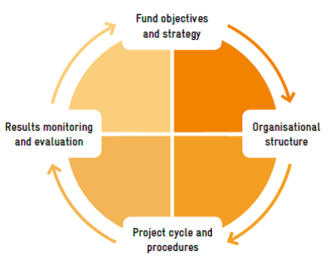Brazilian National Fund on Climate Change (Fundo Clima)
Introduction
The Brazilian National Fund on Climate Change (Fundo Nacional sobre Mudança do Clima or Fundo Clima, FC) was established in 2009 by law 12.114 “with the aim of ensuring resources to support projects or studies and finance initiatives that focus mitigation of climate change as well as adaption to climate change and its effects”[1], and further regulated in 2010 by Decree 7343[2]. Fundo Clima is mainly financed by revenues generated from a tax on oil companies, but article 03 of Law 12.114 also authorizes it to receive donations from public and private national institutions, international loans and donations. It is managed by a multi-sector steering committee presided by the Brazilian Ministry for the Environment (Ministério do Meio Ambiente, MMA) and operates in two modalities – non-refundable and refundable resources. Refundable resources are operated by the Brazilian Development Bank (Banco Nacional de Desenvolvimento Econômico e Social, BNDES) and, at low interest rates, offer loans for mitigation and adaptation projects and technologies in areas such as urban mobility, sustainable cities, renewable energy, efficient machinery and equipment, among others[3]. Non-refundable resources are directly managed by the MMA, until now mostly directed towards adaptation projects and measures.
The table below shows Fundo Clima´s financial resources indicated by the National Budget.
Table: financial volume Fundo Clima
| Year | Total Mio. BRL (EUR, aprox.) | Non-refundable (EUR, aprox.) | Refundable (EUR, aprox.) | Admin. Costs (EUR, aprox.) |
| 2011 | 234 (81) | 30 (10) | 200 (69) | 4 (1,4) |
| 2012 | 394 (135) | 29 (10) | 360 (124) | 5 (1,7) |
| 2013 | 389 (134) | 28 (10) | 360 (124) | 4 (1,4) |
| 2014 | 390 (134) | 27 (9) | 360 (124) | 3 (1) |
| Sum | 1.407 (483) | 114 (39) | 1.280 (441) | 16 (5,5) |
Source: MMA; numbers were rounded off, conversion rate: 1 EUR = 2,9 BRL.
To strengthen the institutional and operational capacity of Brazil´s National Climate Fund, cooperation between MMA and Deutsche Gesellschaft für Internationale Zusammenarbeit (GIZ) GmbH[4] started in 2012. In this context, GIZ provided technical advice with a focus on improving management models and tools.
A factsheet about Brazil´s Fundo Clima is available here:
Cooperation regarding organizational development of Fundo Clima
To learn and benefit from experiences with other funds, a desktop study about GIZ´s international experiences with institutional strengthening of other climate funds was elaborated at the beginning of the cooperation between GIZ and Fundo Clima:
It´s not just the money (2012)
“It´s not just the money” presents lessons learned from technical assistance and capacity development projects with funds and supported the discussions about the objectives and activities of the cooperation between Fundo Clima and GIZ. Main critical issues in setting up funds are shown in the following graph:
Graph: Critical issues in setting up funds
Source: GIZ 2012.
Organizational development activities were synthesized in the Fundo Clima´s Organizational Development Plan. The Organizational Development Plan presents a management concept for Fundo Clima, describes its basic elements, identifies critical issues, likely scenarios and priority areas for intervention, also defining fundamental attributes such as mission, vision and values. The Annual Management Report 2013 disclosed those attributes[5].Beside this, the cooperation partners worked on prior areas of intervention identified in the Organizational Development Plan – capacity building and improvement of managerial methods and tools. In this context, project management cycle was analysed and categorized in four main phases:
- Project selection: Includes public calls for projects, development and submitting of project concepts from proponents, analysis and selection of projects;
- Adjustment / Review: Agreements on administrative and management issues (timeframe, indicators, working plans etc.) and signature of contracts;
- Monitoring: In loco and/or remote monitoring and reporting by assigned inspectors from MMA;
- Closure: Administrative closure of the project, after the end of its activities.
The management procedures and tools used by Fundo Clima throughout its project management cycle were then identified and analyzed. As a result, three tools from the selection phase were developed or optimized. They are available at Fundo Clima´s website:
Project proposal template (2014)
Fundo Clima already worked with a project proposal template and demanded proponents to format projects accordingly. Based on the Logical Framework Approach, an optimized project proposal template provides methodological consistency for the elaboration of projects, demands detailed and precise information and should facilitate analysis and comparability.
Project proposal guidelines (2014)
The project proposal guidelines complement the project proposal template by providing instructions and explanations for each of its items. These guidelines allow proponents to clarify their doubts by themselves, with the aim of improving the overall quality of the projects, reducing demand for clarifications to the Fund´s staff and correction´s requests.
The glossary of concepts presents definitions of selected concepts to detail expressions used in the project proposal template, project proposal guidelines, and in other managing and administrative documents and procedures.
Further Information
- Homepage Fundo Clima
- Fundo Clima´s non-refundable projects
- Fundo Clima´s refundable resources: Fundo Clima Program BNDES
References
- ↑ Presidência da República 2009: Lei Nº 12.114. http://www.planalto.gov.br/ccivil_03/_Ato2007-2010/2009/Lei/L12114.htm (Retrieved on 09.12.2014)
- ↑ Presidência da República 2010: Decreto Nº 7343. http://www.planalto.gov.br/ccivil_03/_Ato2007-2010/2010/Decreto/D7343.htm (Retrieved on 11.12.2014)
- ↑ Information about interest rates of refundable resources managed by BNDES can be found on: http://www.bndes.gov.br/SiteBNDES/bndes/bndes_pt/Institucional/Apoio_Financeiro/Programas_e_Fundos/Fundo_Clima/index.html (Retrieved on 09.12.2014)
- ↑ As a federal enterprise, the Deutsche Gesellschaft für Internationale Zusammenarbeit (GIZ) GmbH supports the federal German government in achieving its international cooperation objectives. Together, Brazil and Germany face global challenges such as preserving biodiversity and fighting climate change. The German Cooperation for Sustainable Development therefore operates primarily in two areas: Protection and sustainable management of Rain Forests as well as Renewable Energies and Energy Efficiency. Within the cooperation with the Brazilian partners GIZ provides advice on strategy development, support for developing management and cooperation structures, as well as technical expertise.
- ↑ MMA 2013: http://www.mma.gov.br/images/arquivos/apoio_a_projetos/fundo_clima/relatoriofundo%20clima%202013-%2006fev2014.pdf (Retrieved on 09.12.2014)




















